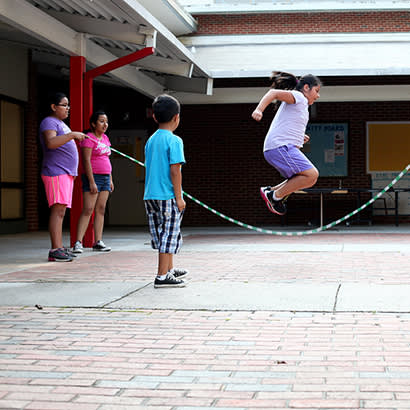
For an enhanced digital experience, read this story in the ezine.
Childhood obesity continues to be a significant health concern in the United States, affecting 22 percent of children ages 2 to 19 — an equivalent of 15 million children. Children of color and from low-income households have disproportionately higher rates of obesity and obesity-related diseases, as well as lower physical activity levels. What’s more, these gaps of inequity have widened in recent years and amount to lifelong consequences. As the earliest generation of children living through the obesity epidemic now enter adulthood, they are the first in U.S. history to have a shorter life expectancy than their parents, mainly due to rising rates of obesity-related cancers and cardiovascular disease. Obesity also profoundly affects children’s self-esteem and social and emotional well-being, as children with severe obesity have similar quality of life as those diagnosed with cancer. However, obesity-related health risks are nearly reversible if children adopt healthy habits and achieve lower body mass index.
Solutions and Interventions
Neighborhood safety, access to medical care, availability of healthy food, and affordability of sports or other activities are just some of the challenging factors that play into addressing obesity in an equitable manner. In North Carolina, Durham Parks and Recreation, pediatricians with Duke Children’s and families came together to address an unmet need: a safe place for physical activity and nutrition education for children with obesity who were not otherwise engaging in recreational activities. The Fit Together model emerged; families receive screening and counseling from a healthcare provider and participate in physical and nutrition education in a local recreation center. Fit Together is a space free from stigma and weight-based teasing, where kids interact with other kids who look like them. Fit Together is accessible to populations disproportionately affected by obesity, engaging minority (31 percent Black, 44 percent Hispanic, 9.4 percent white) and low-income families (69 percent on Medicaid). Participation in these programs enhances quality of life, improves cardiovascular health, and helps establish a healthy lifestyle.
Does It Work Elsewhere?
Since 2009, the program has offered a safe and fun environment to put into practice the lifestyle modifications that are necessary to treat childhood obesity and maintain a healthy lifestyle. Fit Together sites have been implemented successfully in eight North Carolina counties. All were able to develop a partnership, adapt the model to their local and cultural needs, hire and train staff, and deliver Fit Together.
Parks and Recreation’s Role in Treating Childhood Obesity
In the 100 largest U.S. cities, there are nearly 23,000 parks and 10,000 recreation centers; 69 percent of people live within a 10-minute walk to a park. Parks and recreation is uniquely situated to support these partnerships because it is located in underserved communities, membership is free for community residents, and it has low program fees with a sliding scale to ensure accessibility. Since park and recreation departments are public agencies funded by federal, state and local tax dollars, city and county governments are invested in park and recreation utilization and community impact. With their extensive fitness programming experience, park and recreation professionals are suited to run Fit Together. In fact, park and recreation centers are second only to public schools in food provision to children. Most park and recreation departments provide nutrition education to the community and many have full-scale kitchens.
How Communities Can Adopt This Model
We have developed an implementation manual, called the Play Book, for pediatric clinicians and recreation professionals seeking to create a Fit Together program. The Play Book, available online, includes education modules, planning tools and progress tracking pages.
Isa Granados, M.S., is a Doctoral Student at Duke University.

